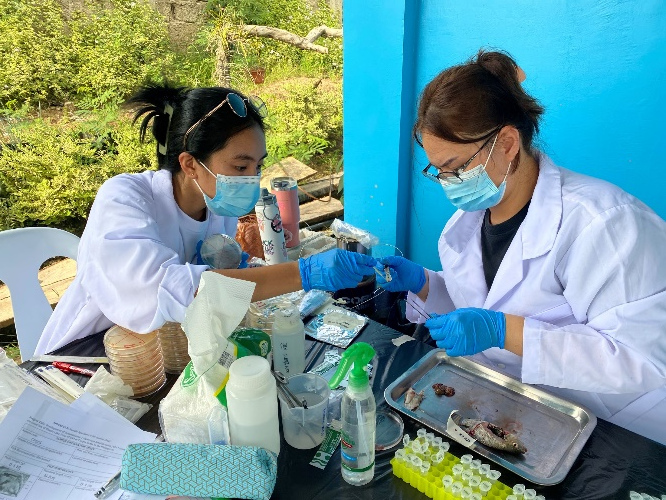As Tilapia Lake Virus (TiLV) infection continues to cause an increasing tilapia mortality and substantially affect the country’s tilapia industry, a project is set to develop a vaccine against it.

Project sample collection in Bohol. (Image Credit: NFRDI-FBC Project team)
Funded by the Philippine Council for Agriculture, Aquatic and Natural Resources Research and Development of the Department of Science and Technology (DOST-PCAARRD), the project, “Development of Baculovirus Expression Vector System (BEVS)-based subunit protein vaccine against Tilapia Lake Virus,” hopes to develop a rationally designed oral subunit protein fish vaccine against Tilapia tilapinevirus using Baculovirus Expression Vector System (BEVS).
According to the report of the Bureau of Fisheries and Aquatic Resources (BFAR) and National Fisheries Research and Development Institute-Fisheries Biotechnology Center (NFRDI-FBC) in the World Organization for Animal Health, the presence of TiLV has been considered as a newly emerging viral pathogen in the country. The considerable mortality rate of tilapia caused by TiLV infection poses potential threats to food security, nutrition, and economy since tilapia has been regarded as a primary commodity, having been one of the nation’s most affordable protein sources.
Now on its first year of implementation, the project has started its preliminary experiments in preparation of the recombinant baculoviruses.

Ceremonial MOA signing between NFRDI-FBC and CYCU-Taiwan last September 26, 2023. (Image Credit: BFAR-NFRDI-FBC Project team)
Last September, the project team from NFRDI-FBC led by Dr. Casiano Choresca Jr., with the strong support of Director Lilian Garcia, sealed a partnership with Taiwan collaborators from Chung Yuan Christian University. Both institutions are committed towards the pursuit of innovation and advancement of science-based solutions to enhance the Tilapia industry.
The development of this vaccine is expected to establish a vital preventive measure and control program against TiLV outbreaks, addressing the significant mortalities they can cause. Moreover, it aims to serve as a reference for policy making to enhance aquaculture practices within the tilapia industry.
Tilapia aquaculture remains significant as it continuously provides the nation with food security and economic development especially as tilapia remains as one of the top cultured commodities in the Philippines. With this, the project is also set to screen antiviral drug targets and anti-viral candidates using in-silico and in-vitro approach as well as create a diagnostic platform that can be used in disease surveillance and diagnosis.
Continuing to work towards its objectives, the project remains dedicated to proactively contribute to ensuring a sustainable aquaculture, providing a reliable source of food and income, especially to the local fish farmers.
